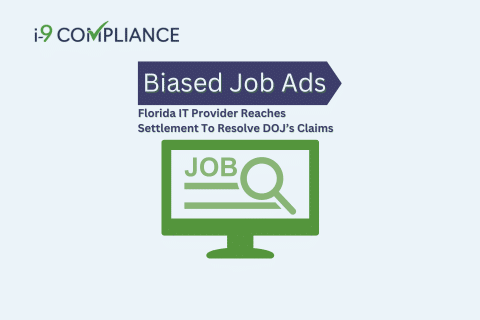Florida IT Provider Reaches Settlement To Resolve DOJ’s Claims of Biased Job Ads

June 6, 2023
The Department of Justice (DOJ) has reached a settlement agreement with a Jacksonville, Florida-based information technology company. This agreement addresses an immigration-related discrimination claim and subjects the company to a $3,855 civil penalty. In addition, the company must submit to two years of monitoring by the federal government. This monitoring would resolve the DOJ’s allegations that the company discriminated against certain job applicants.
The DOJ’s announcement also explained the Department’s findings from investigating the issue. According to the DOJ, the company posted a job through a recruiting agent that restricted applications for certain immigration statuses. The DOJ claimed the “Software Developer Exclusively for OPT” advertisement described the criteria “must be under OPT visa right now.”
The OPT program, or Optional Practical Training, applies to foreign nationals studying in U.S. colleges or universities. This program offers them the opportunity to acquire practical experience by using their education in the workforce. It also allows foreign nationals to accept temporary employment by a U.S. company; the position must pertain to their area of study.
However, this does not permit employers to discriminate against other applicants with lawful work authorizations. For example, employers cannot discriminate against U.S. citizens, lawful permanent residents, asylees, and refugees.
Under the Immigration and Nationality Act (INA), employers cannot discriminate against individuals in the recruitment, hiring, or firing processes. In addition, the INA specifies that employers cannot discriminate based on an applicant’s citizenship, immigration status, or national origin. Unfortunately, such discrimination often occurs when advertising for positions. It also frequently appears during onboarding when verifying an individual’s permission to work.
According to the Assistant Attorney General for the DOJ’s Civil Rights Division, “Employers cannot use unlawful discriminatory language in job postings to exclude applicants based on their citizenship or immigration status. The Justice Department will continue to enforce the law against these types of pernicious employment practices.”
Under the settlement, the employer will pay a $3,855 civil penalty. In addition, the employer must refrain from listing any restrictions related to citizenship, immigration, or visa statuses in job advertisements. These listings include any posted by its recruiters. The employer must also post notices regarding anti-discrimination protections, provide relevant staff with training regarding the INA’s requirements, and submit to two years of monitoring by the DOJ.
As this settlement illustrates, navigating the INA’s requirements can quickly become complex. Unfortunately, this can expose employers to significant liability. For example, employers may find the employment eligibility verification (Form I-9) and E-Verify processes challenging due to the INA’s requirements. These processes require employers to verify new hires’ identities and work authorizations.
The best way to ensure compliance with federal and state requirements is to invest in an electronic I-9 management system. The right system will also have E-Verify integration, effectively addressing both challenges. This tool can help guide employers through every step and provide a suite of tools to help maintain compliance.
When it comes to your employees, automation makes eligibility verification quick and simple. Ensure compliance today with I-9 Compliance.